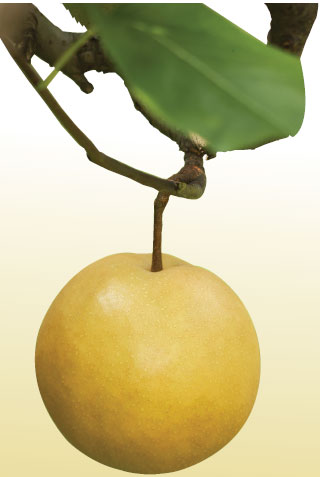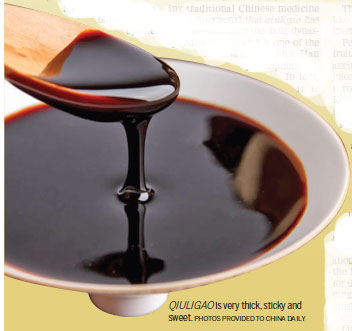Sweet pears to soothe the body


Five thousand years of culinary wisdom means that the Chinese have a food for every season and a dish to cure every ill.
For as long as we can remember, our elders have pointed to a plate or bowl and uttered the immortal words: "This is good for you." Sometimes, children would wrinkle their noses in disbelief, especially when it was a particularly bitter brew or a plate of liver. But in my childhood, I do remember a time when my chubby hands had actually reached out eagerly.
It was autumn, and the winds had started biting into bones, drying up the summer humidity with brisk efficiency. Throats were just as dry, and that often led to bouts of coughing to ease the itch.
That was when we'd be fed spoonfuls of pear jam or qiuligao, which is not really a jam, although it is very thick, sticky and sweet.
Instead, it is an ancient herbal concoction of grated autumn pear cooked in its own syrup with dried Chinese jujubes. Just like certain fruit jellies, the mixture is then strained of pulp and left to thicken in the pot. Honey is added and then the concoction is bottled and doled out at the first sign of a cough during the long autumn and winter.

It was not until I started researching traditional Chinese medicine that I discovered that qiuligao has been around since the Tang dynasty (AD 618-907) and is one of the most famous ethnic Han prescriptions.
In fact, it is so well-known that there are Beijing restaurants named after it, serving the diluted syrup in copper teapots as a main attraction, with the menu built around it.
Besides tasting good, it is, of course, full of beneficial qualities.
Chinese pears are large and very juicy, with white flesh that is almost translucent. The famous Korean or Japanese nashi pears are very similar and probably a relative. Chinese varieties grow all over the country and may vary from the huge 1-kilogram monsters from Yunnan to much smaller, delicate pears shaped like a duck torso with a rotund body topped and tailed by narrower sections.
Their names are equally attractive, like snow pears, snowflake pears, green pears and duck pears.
Pears are regarded as cooling fruits and represent the yin in balancing out the yang of summer. Pear juice cools the body and soothes the throat. A favorite drink in Hong Kong at street-side fruit juice stands is a cup of juice made from freshly pulverized snow pears.
And it is because it is such a cooling fruit that qiuligao is made with the addition of jujubes, or the familiar dried Chinese dates. These deep maroon native fruits are known for their blood-stimulating qualities, a fiery property that offsets the chill of the autumn pears.
Traditional Chinese cures are all about achieving perfect balance in the body and so, different recipes for this pear syrup may also include ginger for heat and flavoring and crushed fritillary bulbs to speed up recuperation from coughs.
Other mild herbs such as maimendong, tiny ophiopogon tubers, can also be added. These are the little creamy tubers of a long green herbal grass related to the rain lily and are used to treat throat inflammations and coughs in TCM.
This pear prescription is believed to be so effective that the Qing emperors bestowed their royal stamp of approval on it and appointed Beijing's Tongrentang Medical Hall as its official guardian.
Even today, Tongrentang's Autumn Pear Secret Concoction is a best-seller at the change of the seasons and used widely to soothe throat, bronchial and lung complaints.
It must be noted that a successful pear jam can only be completed with the addition of raw honey (sugar is never used). Sugar is a high-energy food that allows a build-up of bacteria when the body is weak, a fact recognized by the ancients.
Qiuligao is a sign of autumn and the impending chills of winter, and nothing builds up a warming immunity better than a hot, steaming cup of diluted pear syrup.
And, for once, it's easy to believe that it's all really good for you.
paulined@chinadaily.com.cn
















